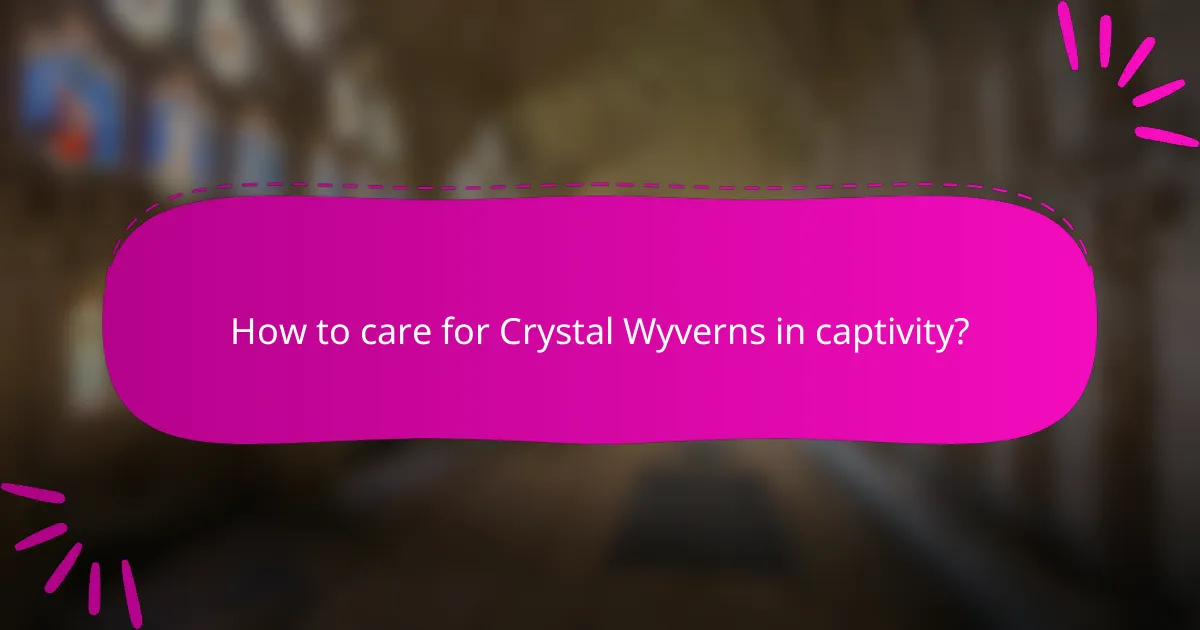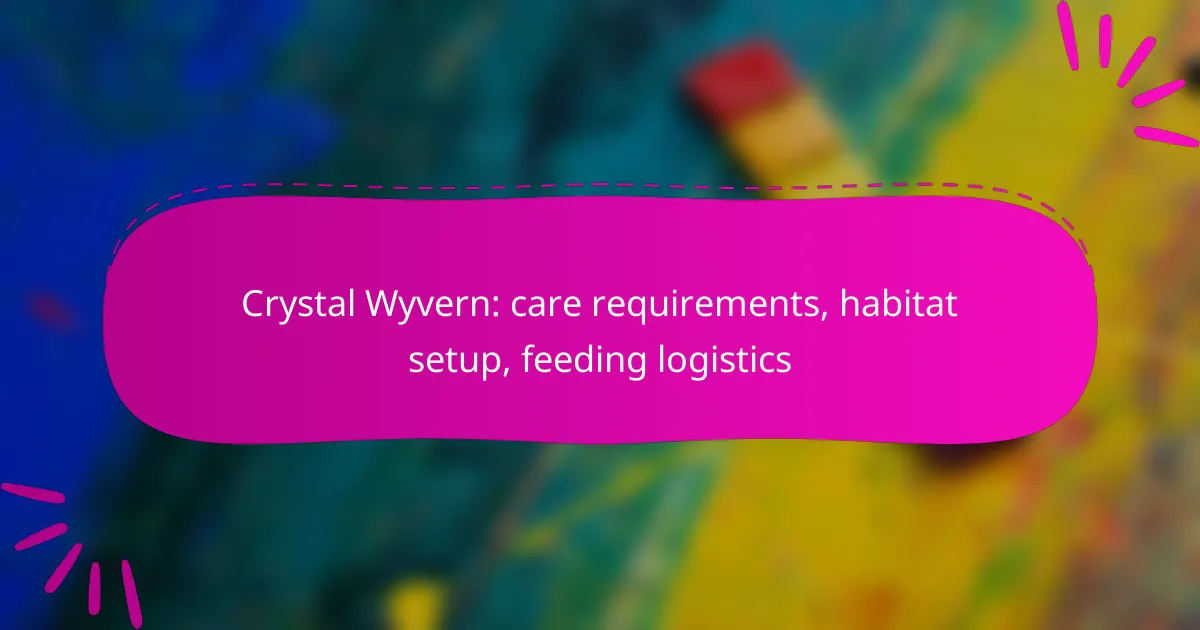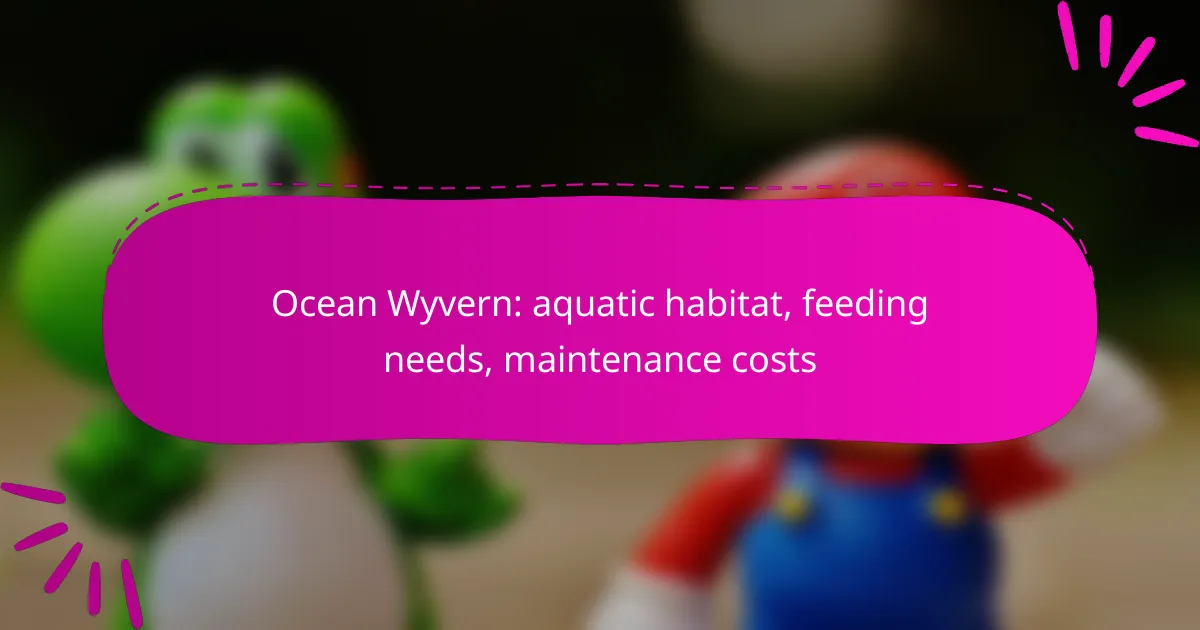Caring for Crystal Wyverns in captivity involves meeting their unique environmental and dietary requirements to ensure their health and well-being. An ideal habitat should replicate their natural environment with sufficient space, proper temperature, and humidity levels. Additionally, understanding their feeding logistics, which include a diet of blood and fruits, is crucial for their care.

How to care for Crystal Wyverns in captivity?
Caring for Crystal Wyverns in captivity requires attention to their specific environmental needs, including temperature, humidity, and space. Providing the right habitat setup and feeding logistics is essential for their health and well-being.
Temperature requirements
Crystal Wyverns thrive in warm environments, ideally between 25°C to 30°C (77°F to 86°F). It’s crucial to maintain a stable temperature to prevent stress or health issues.
Using heat lamps or under-tank heaters can help achieve the desired warmth. Monitor the temperature regularly with a reliable thermometer to ensure it remains within the optimal range.
Humidity levels
Maintaining humidity levels between 50% to 70% is vital for Crystal Wyverns. This range supports their respiratory health and overall hydration.
Utilize a hygrometer to monitor humidity and consider misting the enclosure or using a humidifier to maintain appropriate moisture levels. Avoid excessive humidity, which can lead to mold growth and respiratory problems.
Enclosure size
Crystal Wyverns require spacious enclosures to accommodate their size and activity levels. A minimum of 200 square feet is recommended for a pair, allowing ample room for flying and exploring.
Ensure the enclosure has vertical space as well, as they enjoy climbing and perching. Include various structures like branches and platforms to enrich their environment.
Lighting needs
Proper lighting is essential for Crystal Wyverns, as they need UVB light for calcium metabolism and overall health. Use UVB bulbs specifically designed for reptiles, ensuring they are positioned correctly within the enclosure.
Provide a light cycle of around 12 hours of light followed by 12 hours of darkness to mimic natural conditions. This helps regulate their circadian rhythm and promotes healthy behaviors.
Health monitoring
Regular health monitoring is crucial for the well-being of Crystal Wyverns. Observe them daily for signs of illness, such as changes in appetite, behavior, or physical appearance.
Schedule routine veterinary check-ups to ensure they are healthy and up-to-date on vaccinations. Keeping a log of their feeding and behavior can help identify any potential health issues early on.

What habitat setup is ideal for Crystal Wyverns?
An ideal habitat setup for Crystal Wyverns includes a spacious environment that mimics their natural habitat, featuring ample vertical space and appropriate temperature ranges. Proper ventilation and humidity levels are essential to ensure their well-being and health.
Recommended substrate
For Crystal Wyverns, a substrate that retains moisture while allowing for good drainage is crucial. Options like coconut coir or a mixture of soil and sand can provide a suitable base. Aim for a substrate depth of at least 5-10 cm to facilitate burrowing and nesting behaviors.
Decor and enrichment
Incorporate natural elements such as branches, rocks, and plants to create a stimulating environment for Crystal Wyverns. These decorations not only provide hiding spots but also encourage climbing and exploration. Consider adding perches at various heights to cater to their natural instincts.
Water source options
Crystal Wyverns require a clean and accessible water source for hydration. Options include shallow bowls or drip systems that keep the water fresh. Ensure that the water source is placed away from direct sunlight to prevent overheating and contamination.

What do Crystal Wyverns eat?
Crystal Wyverns primarily consume a diet of blood, which they obtain from their prey, and they also enjoy fruits. Understanding their dietary needs is essential for proper care and habitat setup.
Dietary preferences
Crystal Wyverns have a strong preference for blood, which they can obtain from various creatures, including smaller mammals and other dinosaurs. They are also known to eat specific fruits, particularly those found in their natural habitats, which provide essential nutrients.
When keeping Crystal Wyverns, it’s crucial to ensure a steady supply of both blood and fruits to maintain their health and energy levels. Offering a variety of prey can help mimic their natural hunting behavior.
Feeding frequency
Feeding Crystal Wyverns should occur regularly, ideally every few hours, to keep them satisfied and healthy. Depending on their activity level and age, they may require more frequent feedings, especially during growth phases.
Monitor their behavior to determine if they are hungry; signs of hunger may include restlessness or aggressive behavior. Adjust the feeding schedule based on their individual needs and preferences.
Supplemental nutrition
In addition to blood and fruits, consider providing supplemental nutrition in the form of specialized wyvern kibble or nutrient-rich treats. This can help ensure they receive a balanced diet and all necessary vitamins and minerals.
Be cautious not to over-supplement, as this can lead to health issues. Regularly assess their overall condition and adjust their diet accordingly to maintain optimal health.

What are the common health issues for Crystal Wyverns?
Crystal Wyverns can experience several health issues, primarily related to their diet, environment, and stress levels. Common problems include malnutrition, respiratory infections, and parasites, which can significantly affect their well-being if not addressed promptly.
Signs of illness
Identifying signs of illness in Crystal Wyverns is crucial for timely intervention. Symptoms may include lethargy, loss of appetite, abnormal behavior, and changes in coloration. Monitoring their activity levels and eating habits can help catch potential health issues early.
Additionally, look for physical signs such as discharge from the eyes or nose, difficulty breathing, or unusual swelling. Any combination of these symptoms should prompt immediate evaluation.
Preventive care
Preventive care is essential for maintaining the health of Crystal Wyverns. A balanced diet rich in nutrients, including appropriate fruits and meats, is vital. Regularly cleaning their habitat and ensuring proper ventilation can help prevent respiratory issues.
Routine health checks, including parasite control and monitoring for signs of stress, are also important. Providing a stable environment with minimal disturbances can reduce anxiety and promote overall health.

How to choose the right supplies for Crystal Wyverns?
Selecting the right supplies for Crystal Wyverns is crucial for their health and well-being. Focus on equipment that meets their specific habitat needs, feeding requirements, and overall care to ensure they thrive in captivity.
Essential equipment
To create a suitable habitat for Crystal Wyverns, you will need a spacious enclosure that mimics their natural environment. This includes a temperature-controlled area, UV lighting, and ample space for flying. Additionally, consider adding climbing structures and water features to enhance their living conditions.
Feeding supplies are equally important. A high-quality diet consisting of specialized pellets, fresh fruits, and insects should be readily available. Use feeding dishes that are easy to clean and refill, ensuring that food remains fresh and accessible.
Recommended brands
For habitat setup, brands like Exo Terra and Zoo Med offer excellent terrariums and lighting solutions tailored for reptiles and exotic pets. Their products are designed to maintain optimal conditions for creatures like Crystal Wyverns.
When it comes to feeding, consider brands such as Repashy and Zupreem, which provide nutritious pellets and supplements specifically formulated for exotic species. These brands are known for their quality and effectiveness in promoting the health of your Crystal Wyverns.










